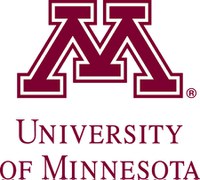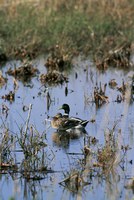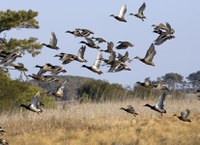Land-grant Universities Added to Winter Cereals Sustainability in Action Initiative
(Click an image below to view a high-resolution image that can be downloaded)
North Dakota State University (NDSU) and the University of Minnesota (U of M) join with Ducks Unlimited (DU) and Bayer CropScience to enhance the Winter Cereals: Sustainability in Action (WCSIA) research and education initiative.
The land-grant universities, along with South Dakota State University, will be working toward new winter wheat varieties with improved characteristics such as winter hardiness, high yield, disease resistance and good milling qualities.
The WCSIA initiative seeks to expand the use of winter wheat as a cropping option for producers and nesting habitat for waterfowl. The initiative promotes a stewardship model for improving the agricultural productivity of farmland while retaining and improving the habitat values important to North America’s waterfowl and other wildlife. Winter cereals provide spring nesting cover as well as additional cropping options to growers.
In recent years, winter wheat production has gained a foothold on North America’s prairie acres. New wheat varieties, improved marketing options and the agronomic advantages provided by the crop make it an attractive choice for growers to include in their crop rotation.
“NDSU is excited to be a partner in this effort,” said D.C. Coston, NDSU Agriculture and University Extension vice president. “Recently, production of winter wheat has been increasing in North Dakota, so providing producers with new and enhanced techniques and technologies will be important for seeing this part of the industry continue to grow.”
Alan Ayers, director of state affairs and stewardship for Bayer CropScience, said the addition of NDSU and the U of M to the WCSIA program is another crucial milestone in the program’s success.
“By joining forces with the universities, we’re able to invest in the next generation of varieties and technologies to ensure continued production of a safe and abundant supply of cereals to meet future food demands,” Ayers said.
“Our goal is to enable cereal growers to produce more food on the same amount of land while preserving and improving the habitat important to North America’s waterfowl and other wildlife,” he said at a briefing in the Loftsgard Hall Atrium on the NDSU campus.
The initiative area in the U.S. stretches across the Prairie Pothole Region of North Dakota, South Dakota and Minnesota, which are the primary nesting grounds for more than 50 percent of North America’s migratory waterfowl.
The winter cereals initiative includes increased winter wheat agronomic assistance, expanded research into new winter wheat varieties and research on the benefits of winter cereals for wildlife and the environment.
“Ducks Unlimited is pleased to be a significant part of the effort to establish a joint winter wheat breeding program at NDSU in cooperation with U of M, along with Bayer CropScience and the wheat grower associations and commissions from North Dakota and Minnesota,” said Blake Vander Vorst, Ducks Unlimited manager of agronomy programs. “New varieties should encourage growers to add winter wheat to their operations.”
""Wheat is crucially important to our food supply, and the University of Minnesota is very happy to be a partner in this effort,"" said Abel Ponce de Leon, senior associate dean in the College of Food, Agricultural and Natural Resource Sciences at the university. ""We look forward to significant results that none of us would be able to achieve without the other partners.""
Also involved in the project is John Lukach, NDSU Extension agronomy specialist. Lukach will be working on the WCSIA project at the NDSU Langdon Research Extension Center. Lukach is responsible for planning, coordinating and conducting winter cereal research, as well as developing and coordinating production and soil management educational materials, meetings, tours and other activities.
Ducks Unlimited is the world’s largest wetland and waterfowl conservation organization with more than 12 million acres conserved in North America. Additional information about Ducks Unlimited is available at http://www.ducks.org.
Bayer CropScience LP is the U.S. business of Bayer CropScience AG. The company focuses on crop protection, nonagricultural pest control, seeds and plant biotechnology. More information is available at http://www.bayercropscienceus.com.
NDSU Agriculture Communication
| Source: | D.C. Coston, (701) 231-6136, ndsu.vpag@ndsu.edu |
|---|---|
| Source: | Becky Jones-Mahlum, (701) 355-3507, bjonesmahlum@ducks.org |
| Source: | Beth Roden, (919) 549-2030, beth.roden@bayercropscience.com |
| Source: | Becky Beyers, (612) 626-5754, bbeyers@umn.edu |
| Editor: | Rich Mattern, (701) 231-6136, richard.mattern@ndsu.edu |
More about Bayer
Bayer is a global enterprise with core competencies in the fields of health care, nutrition and high-tech materials. Bayer CropScience AG, a subsidiary of Bayer AG with annual sales of about EUR 6.5 billion (2009), is one of the world’s leading innovative crop science companies in the areas of crop protection, nonagricultural pest control, seeds and traits. The company offers an outstanding range of products and extensive service backup for modern, sustainable agriculture and for nonagricultural applications. Bayer CropScience has a global work force of 18,700 and is represented in more than 120 countries. This and further news is available at: http://www.press.bayercropscience.com.







